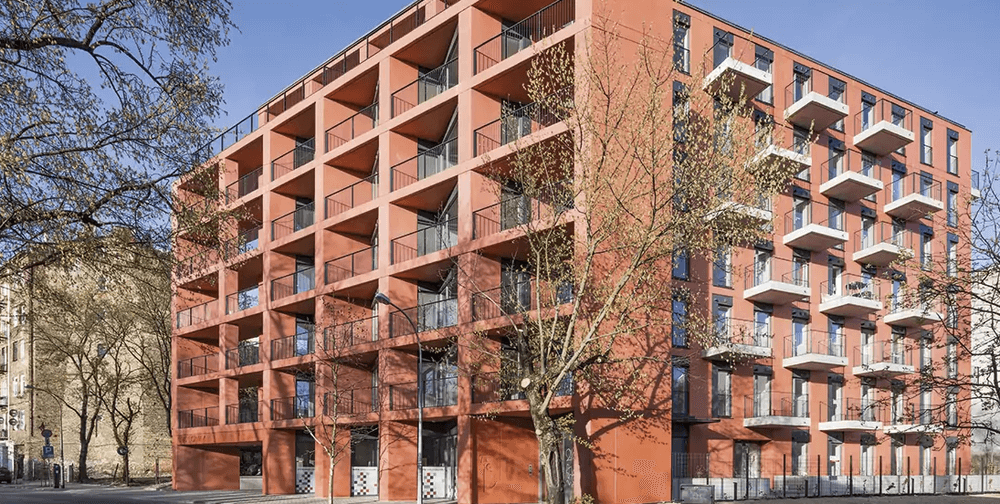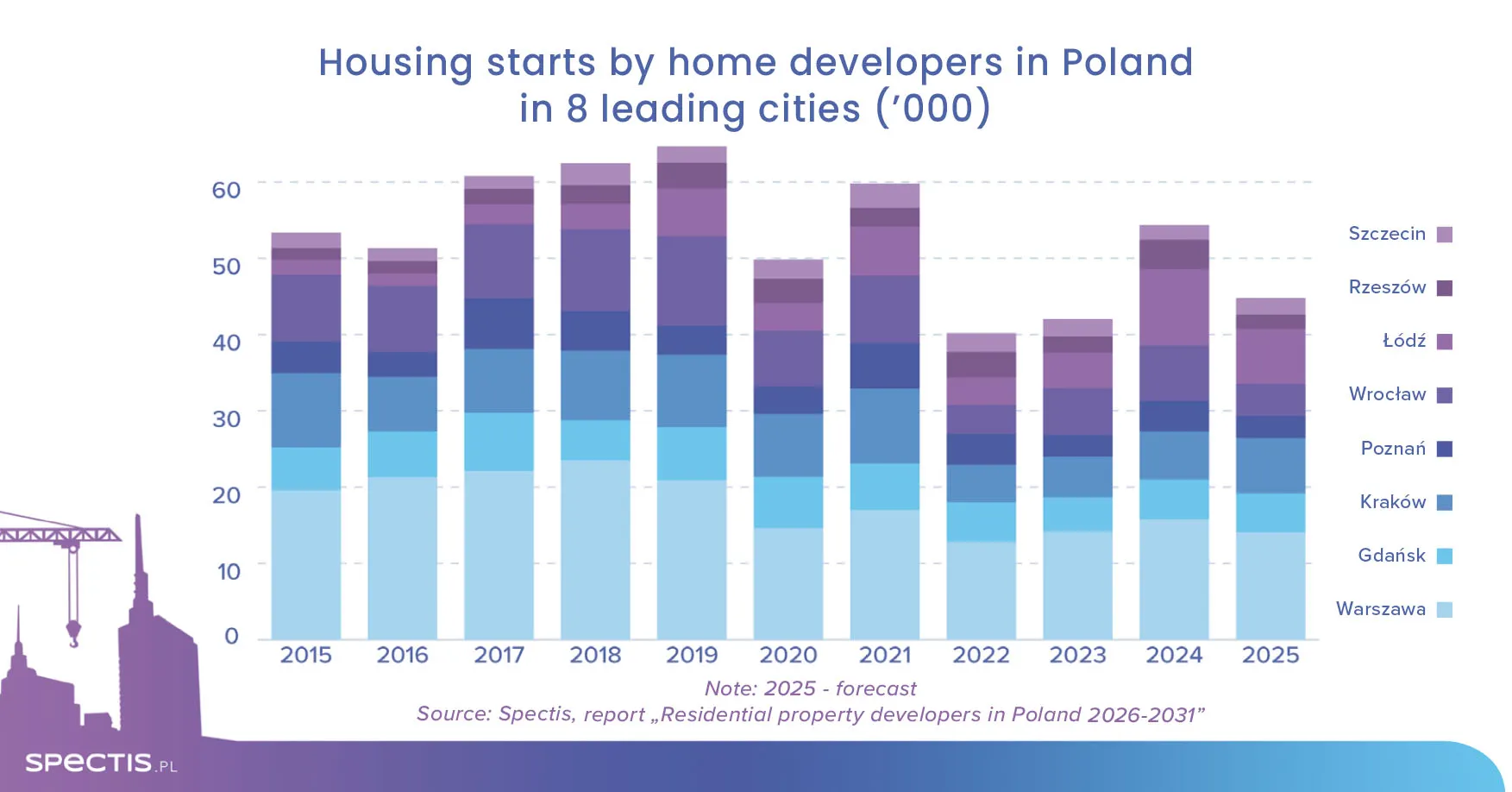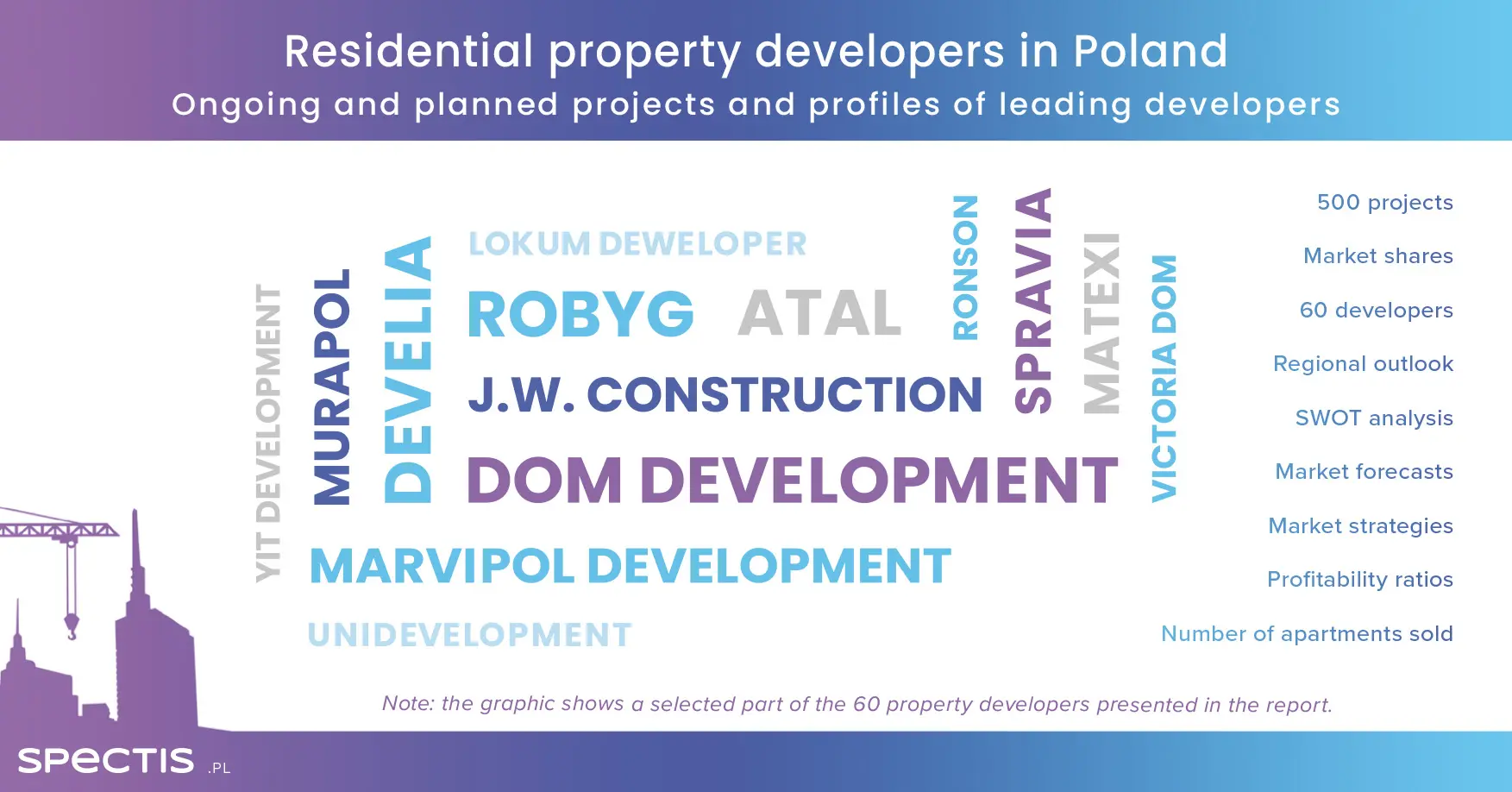Modular construction in Poland is dynamically developing, bringing solutions that gradually change the face of architecture and construction. Thanks to the use of prefabricated modules, buildings can be erected faster, cheaper, and with less impact on the environment.
Although the Polish modular construction market is still in the early stages of development, interest in this technology continues to grow steadily. A growing number of investors and contractors are recognising the potential of prefabrication as an efficient method for delivering a wide range of construction projects. The number of large-scale modular and prefabricated projects has seen a noticeable uptick since around 2015.
Below we present examples of modular construction projects already completed or currently underway in Poland. While such developments still represent a small portion of the overall market, their share is expected to increase in the coming years.
Examples of modular construction projects - residential sector
Sprzeczna 4 in Warsaw

Between 2015 and 2017, Budizol served as both the investor and general contractor for a residential development at Sprzeczna 4 in Warsaw. The project included the construction of 57 apartments using precast reinforced concrete and mass-coloured architectural concrete, clearly visible on the building façade. This development has received several prestigious architectural awards and is recognised as one of the key pioneers of modern concrete prefabrication in Poland’s multi-family housing segment.
Ja_Sielska housing estate in Poznań

Between 2018 and 2024, Pekabex Development, in cooperation with Pekabex BET, completed a three-stage residential project called Ja_Sielska in Poznań. The development was delivered using full concrete prefabrication, including single-, double-, and triple-layer precast walls, Filigran slabs, HC and HM prestressed hollow-core slabs, and precast staircases and balconies.
Celulozowa in Włocławek - phases I and II

Municipal housing developer MBM Włocławek delivered a modern residential project comprising 432 units. Construction works began in Q3 2020 and were completed in Q1 2024. The general contractor was Pekabex BET, which used concrete prefabrication technology for the build.
Okólna in Toruń

PFR Nieruchomości delivered a residential project at Okólna Street in Toruń, comprising 320 apartments. Construction works began in Q4 2020 and were finalised in Q3 2022. The buildings were constructed using mass-coloured precast concrete elements, with Pekabex BET acting as the general contractor.
Casa Fiore in Warsaw - Międzylesie

Pekabex Development delivered a 40-unit apartment project at Hafciarska Street in Warsaw using enhanced modular technology, with improved thermal and acoustic insulation. Construction started in Q3 2021 and was completed in Q1 2023. Pekabex BET was responsible for project delivery.
Naturalnie Aluzyjna in Warsaw

In 2023, developer J.W. Construction delivered a residential development consisting of two four-storey buildings. The project was executed using timber-frame prefabrication technology, integrating sustainable and energy-efficient solutions such as heat pumps and photovoltaic panels.
Na Wzgórzach housing estate in Zawada

J.W. Construction also completed a modular housing development in Zawada near Myślenice. The project includes nine three-storey apartment buildings with a timber modular structure. Construction was finalised in Q1 2024.
Wola Village in Kraków

URBA is currently developing a housing estate in Kraków consisting of 34 residential buildings. The buildings are being constructed using energy-efficient precast wall systems. Completion is scheduled for Q3 2024.
UP2U housing estate in Poznań

Trei Real Estate, together with general contractor Pekabex BET, is delivering a residential project at Piątkowska 78 in Poznań comprising 460 apartments. The development, carried out under the PRS (Private Rental Sector) model, began in 2023 and is scheduled for completion in 2026. Construction involves the use of concrete precast elements supplied by the Pekabex Group.
Legionów in Elbląg

PFR Nieruchomości is currently developing a residential project at Legionów Street in Elbląg, which will deliver 148 apartments. Construction works began in Q1 2024 and are scheduled for completion in Q4 2025. Pekabex BET is the general contractor, using precast reinforced concrete elements.
Orzeszkowej in Ogrodzieniec

Developer SIM Zagłębie is constructing a 46-unit residential project on Orzeszkowej Street in Ogrodzieniec using energy-efficient modular timber technology. The general contractor is Unihouse. Construction began in Q1 2024 and is expected to conclude in Q4 2024.
Student housing on Puławska Street in Warsaw

Project company SPV, a joint venture of Solida Capital and 1 Asset Management, is developing an eight-storey student housing facility on Puławska Street in Warsaw. The building will offer a total usable floor area of 7,500 m². Construction started in Q1 2024 and is expected to complete in Q3 2025. Pekabex BET is the general contractor, delivering the project using precast concrete components.
ECO Berensona estate in Warsaw
.jpg)
In 2025, J.W. Construction is delivering the second phase of the ECO Berensona housing estate in Warsaw's Białołęka district. The project consists of four two-storey buildings with a total of 138 apartments ranging in size from 32 to 58 m². The development will also feature one retail unit and 142 parking spaces, both underground and at-grade. The estate is being built using modular timber prefabrication technology.
Pastelowo housing estate in Poznań
.jpg)
Scheduled for completion in 2025, the Pastelowo housing estate in Poznań is being developed by Vastint. The project consists of seven residential buildings comprising a total of 255 units ranging in size from 33 to 100 m². The development uses prefabricated components supplied and assembled by Eko-Pref sp. z o.o. The site also includes a separate garage building built with prefabricated elements provided by Pozbruk.
Residential development in Będzin
.jpg)
In Będzin, on Odkrywkowa Street, Unihouse is delivering a modular housing development consisting of seven buildings with a total of 95 residential units ranging from 40 to 98 m². Each building has two storeys and a usable attic. The project is being delivered using timber-frame prefabrication, enabling rapid implementation while ensuring sustainable, modern housing standards. Completion is planned for Q2 2026.
Rudzka housing estate in Rybnik
.jpg)
In Rybnik, Inżbud is working in partnership with modular home manufacturer Solitar Fabryka Domów from Żory to deliver a new housing estate. The development includes 28 buildings and 56 residential units. The project is being constructed using modular timber prefabrication, supporting rapid implementation and sustainable construction. Completion is scheduled for November 2026.
Residential project in Lubawka
.jpg)
In August 2025, Unihouse signed a contract for the construction of a modular residential building using timber-frame technology. The project will be located on Karkonoska Street in Lubawka (Lower Silesia province).
Housing estate in Śrem
.png)
In August 2025, Pekabex Bet, a subsidiary of the Pekabex Group, won a tender issued by Śremskie TBS sp. z o.o. for the construction of a complex of eight multi-family buildings in Śrem, located on Farna Street. The development will consist of 195 apartments built on a 2.7 ha site, with a targeted delivery timeframe of just 10 months. The buildings will be constructed using concrete prefabrication technology.
Examples of modular construction projects - commercial and public sector
Modular construction is gaining traction not only in the residential segment but also across public utility and commercial building sectors. An increasing number of investors are turning to this solution due to the speed of delivery, precision of workmanship, cost-efficiency, and high build quality.
The rising demand for modular construction (both 2D and 3D) in Poland is being driven by multiple factors. Prefabrication addresses current construction market challenges — including labour shortages and time constraints — while also responding to environmental and sustainability goals. Timber modular technologies, in particular, align with these trends. Technological advancement is enabling increasingly sophisticated modular designs that meet the highest functional and aesthetic standards.
Below are examples of modular construction projects in the public utility and commercial segments, both completed and currently under development.
FoRest hotel complex in Sławica

Investor Weranda Family, in partnership with contractor DMD Modular, expanded the FoRest hotel complex in Sławica using modular steel-frame technology. The first phase of the expansion added five buildings with a total built-up area of 175 m².
R&D Center office building in Gdańsk

Ecologiq served as both designer and general contractor for an office and laboratory building with a total usable area of 1,246 m². The project was delivered using modular prefabrication technology and accommodates around 35 office staff, working in both traditional offices and two open-plan spaces.
Hotel BoniFaCio Spa & Sport Resort in Sochocin

In 2017, the BFC Group, in cooperation with DMD Modular, delivered an expansion of the BoniFaCio Spa & Sport Resort in Sochocin. The project used steel modular construction and has a total floor area of 638 m².
Eco kindergarten no. 80 in Gdańsk

General contractor Ecologiq designed and delivered a modular kindergarten in Gdańsk consisting of 12 symmetrical modules, with a total built-up area of 1,475 m². The buildings were constructed using solid KVH timber. The project was handed over in 2018.
Cultural activity centre in Skawina

In early 2024, a cultural activity centre was opened in the Rzepnik district of Skawina (Lesser Poland province). Built by Qmodular Trade using steel modular construction, the facility consists of 22 modules with a total floor area of 1,000 m². The entire investment was delivered in six months.
Modular school in Pruszków - expansion

In 2024, Unihouse completed the expansion of Primary School No. 3 in Pruszków. The project was delivered using 50 prefabricated timber modules, increasing the school’s usable area by 2,600 m².
Care and housing centre in Michałowice

In 2024, a 575 m² care and housing facility was delivered in Michałowice (Lesser Poland). The project was built using modular timber construction and completed within six months.
Voivodeship Specialist Hospital in Legnica - redevelopment

In 2024, Climatic completed a redevelopment of the modular hospital in Legnica. The original facility, delivered in 2021 in response to COVID-19, was also built by Climatic.
Hospital in Ostróda

In 2024, Ekoinbud completed the first hospital in Poland built using timber-frame modular construction. Construction started in 2023, and the building’s usable floor area is 2,400 m².
Tertio Ponte office building in Włocławek

In early 2024, Budizol delivered the Tertio Ponte office building in Włocławek, built using nearly 1,600 precast concrete elements. The total usable area is 8,000 m². All prefabricated components were installed in just four months.
Teaching facility no. 2 at the Military University of Technology in Warsaw

In September 2024, Climatic handed over a five-storey modular teaching facility for the Military University of Technology in Warsaw. The building comprises 28 modules and a total floor area of 2,200 m². The design-and-build project was completed in just 10 months.
Nursery in Karczew

In October 2024, a nursery facility was delivered in Karczew (Mazowieckie province) by Ekoinbud. The timber-frame modular building includes 25 rooms and has a usable area of 500 m². Construction was completed in just six months.
Central Museum Storage Facility in Lesznowola

By the end of 2024, work will be completed on the Central Museum Storage Facility in Lesznowola. Subcontractor Poz Bruk is supplying over 1,200 prefabricated elements, including 430 insulated and cladded walls and 800 internal partition walls. The general contractor is a consortium of Polimex Infrastruktura and Polimex Mostostal.
Teaching complex in Kłodzko

In October 2024, Modular System began construction of a modular teaching complex in the Kłodzko municipality. The investment responds to urgent educational needs after floods in September. The steel modular system enables rapid completion, allowing children and youth to return to school in a safe, modern setting. Upon completion, the facility will be donated to the municipality.
Office building for State Forests in Potrzebowice

The State Forests office building in Potrzebowice (Greater Poland) is scheduled for completion in Q1 2025. The 1,060 m² facility is being constructed by Ekoinbud using modular timber technology. The construction timeframe is just seven months.
Nursery in Łysomice

By the end of March 2025, a new nursery will be completed in Łysomice (Kuyavian-Pomeranian province), with a total floor area of over 400 m². The building will be delivered using 3D modular timber construction. The modules are being produced in Ostaszewo near Toruń, at the prefabrication plant of general contractor MOD 21. The project includes technologies such as a ground-source heat pump and photovoltaic panels. The total contract value is PLN 4.4m. This is MOD 21’s first project in Poland.
Military barracks for the Polish Armed Forces in Augustów

On 16 October 2024, a consortium of Climatic and Techko was awarded a contract to build two military barracks with administrative office space and four mobile warehouse halls in Augustów. The project will be delivered using steel modular technology and associated infrastructure. It will be the largest modular investment completed to date for the Polish Armed Forces, with delivery scheduled within 21 months.
Education Support Centre in Łódź
On 5 October 2024, Pekabex signed a design-and-build contract with the Medical University of Łódź for the construction of a new Education Support Centre. The facility is being delivered using concrete prefabrication and is scheduled for completion in spring 2026.
Summary
In the coming years, we expect a significant increase in the number of non-residential modular projects. This segment is still in the early stages of dynamic development, and each successfully delivered project serves as further promotion for the broader use of modular technologies. According to the Spectis report Modular construction market in Poland, the years 2025-2026 may prove to be a turning point, particularly due to the availability of substantial EU funding under the National Recovery Plan. With the necessity to use these funds within a limited time, modular technology will, in many cases, be the only viable way to complete projects before 2027.
2D prefabrication dominates Poland’s modular construction market
In the Spectis modular construction report, the market is divided into two main types: 2D and 3D (with additional segmentation based on the structural material used). The examples presented above primarily represent 2D modular construction, which uses flat elements assembled on-site. This approach allows for greater flexibility in design and transport. Despite the faster construction process and higher precision of 3D modular systems (which use volumetric modules delivered as nearly complete building segments), they remain less common in Poland due to higher storage and logistics demands, and higher production costs. However, we believe the gap between these two technologies will gradually narrow over time.
To learn more or download a sample of the report, visit our store:


